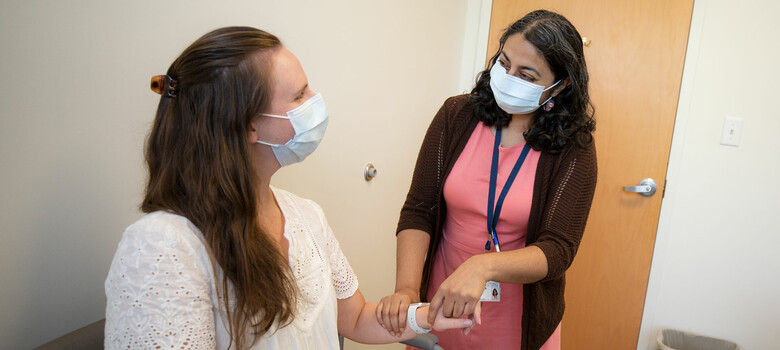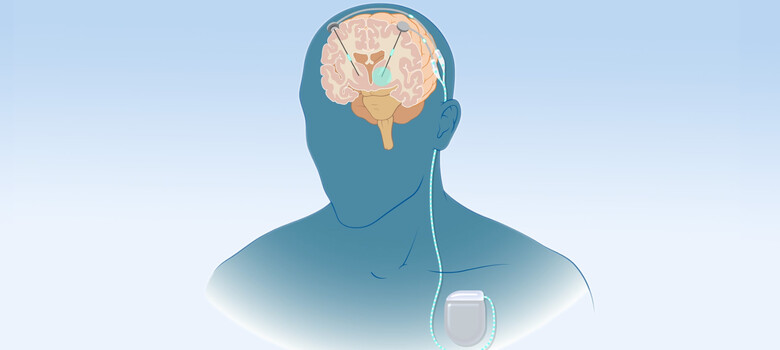Essential tremor is sometimes confused with Parkinson’s disease, but these movement disorders are different. Essential tremor tends to worsen during activity (for example, writing or lifting a cup to drink), whereas Parkinson’s is more prominent during rest. And although essential tremor can worsen over time, it usually progresses much slower than Parkinson’s. It is possible to have a “mixed tremor,” which means you could have essential tremor and another type of movement disorder, like Parkinson’s.
Essential Tremor
Duke neurologists and neurosurgeons offer effective, advanced treatments for essential tremor -- involuntary shaking that most often affects your hands but can also affect the head and voice. If the treatments you’ve tried have not been effective, we can offer options that aren’t available elsewhere. Our specially trained movement disorder specialists partner with you to set goals, reduce shaking, and improve your quality of life.
About Essential Tremor
Tests
To diagnose essential tremor, your doctor will ask about your family history, medical history, signs, and symptoms and will perform a physical exam. They may also recommend the following tests.
Neurological Exam
Your doctor will check your reflexes, walking gait, coordination, muscle strength, and sensation.
Lab Tests
Blood and urine tests can help rule out other causes of tremor, like medication side effects or thyroid dysfunction.
Performance Tests
You may be asked to perform simple tasks like drawing a spiral, writing your name, or drinking from a cup.
Duke Health offers locations throughout the Triangle. Find one near you.
Treatments
Medications
Medicines like beta-blockers, anti-seizure medications, and anti-anxiety medications can help reduce shaking caused by tremors.
Therapy
Physical therapists recommend exercises to improve your muscle strength and function and reduce tremors. Occupational therapists educate and guide you about how to adapt your environment and lifestyle to reduce the effects of tremors on your daily life. They may recommend assistive devices that can temporarily reduce tremors or counteract tremor activity. Speech therapy may be recommended if you have voice tremors.
Botox
Botox injections can help reduce head and voice tremors by relaxing key muscles and nerves.
High-Intensity Focused Ultrasound
High-intensity focused ultrasound (HIFU) is an incisionless procedure that uses more than 1,000 ultrasound beams to disrupt the brain circuit responsible for essential tremor. Because the procedure requires no incisions, you can return home the same day.
Deep Brain Stimulation (DBS) Surgery
Deep brain stimulation is a highly effective treatment for people with essential tremor. During this minimally invasive surgical procedure, electrodes are carefully implanted in your brain, and a small battery is placed under the skin in your chest. Electrical impulses modify brain activity to reduce tremors.
Why Choose Duke
Advanced Treatments
From medication management and other initial therapies to more advanced options like deep brain stimulation and focused ultrasound, we can offer the treatment that is right for you. We take pride in helping people with essential tremor return to the activities they enjoy.
Comprehensive Care
Our comprehensive movement disorders program includes specially trained neurologists; neurosurgeons; neuroradiologists; social workers; nurses; pharmacists; physical, occupational, and speech therapists; and other experts. We work as a team to care for you and your family.
Clinical Trials
Our researchers are committed to discovering how to better treat and even cure movement disorders like essential tremor. By participating in clinical trials at Duke, you may have access to treatments that are not yet widely available.
Where you receive your care matters. Duke University Hospital is proud of our team and the exceptional care they provide. They are why our neurology and neurosurgery program is nationally ranked, and the highest-ranked program in North Carolina by U.S. News & World Report for 2024–2025.



